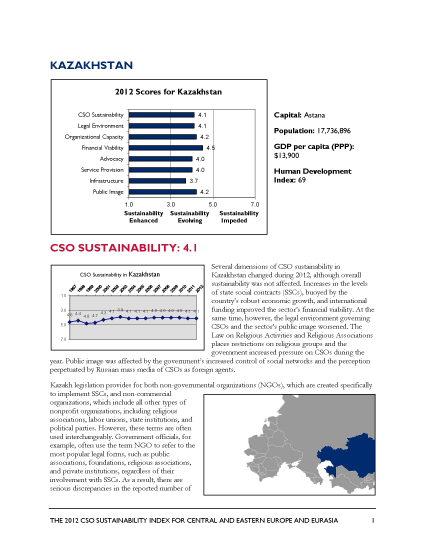Speeches Shim
CSO SUSTAINABILITY: 4.1
Several dimensions of CSO sustainability in Kazakhstan changed during 2012, although overall sustainability was not affected. Increases in the levels of state social contracts (SSCs), buoyed by the country’s robust economic growth, and international funding improved the sector’s financial viability. At the same time, however, the legal environment governing CSOs and the sector’s public image worsened. The Law on Religious Activities and Religious Associations places restrictions on religious groups and the government increased pressure on CSOs during the year. Public image was affected by the government’s increased control of social networks and the perception perpetuated by Russian mass media of CSOs as foreign agents.
Kazakh legislation provides for both non-governmental organizations (NGOs), which are created specifically to implement SSCs, and non-commercial organizations, which include all other types of nonprofit organizations, including religious associations, labor unions, state institutions, and political parties. However, these terms are often used interchangeably. Government officials, for example, often use the term NGO to refer to the most popular legal forms, such as public associations, foundations, religious associations, and private institutions, regardless of their involvement with SSCs. As a result, there are serious discrepancies in the reported number of CSOs in Kazakhstan. According to the Ministry of Justice, there were 57,740 registered non-commercial organizations in 2012. According to the Secretary of State at the Fifth Civic Forum in 2011, there were 18,000 NGOs, of which about 2,000 were active. The sector employs about 1 million people, and provides services to over 5 million people.


Comment
Make a general inquiry or suggest an improvement.